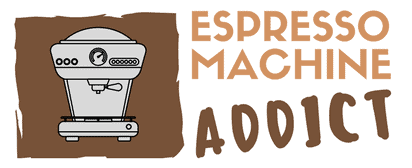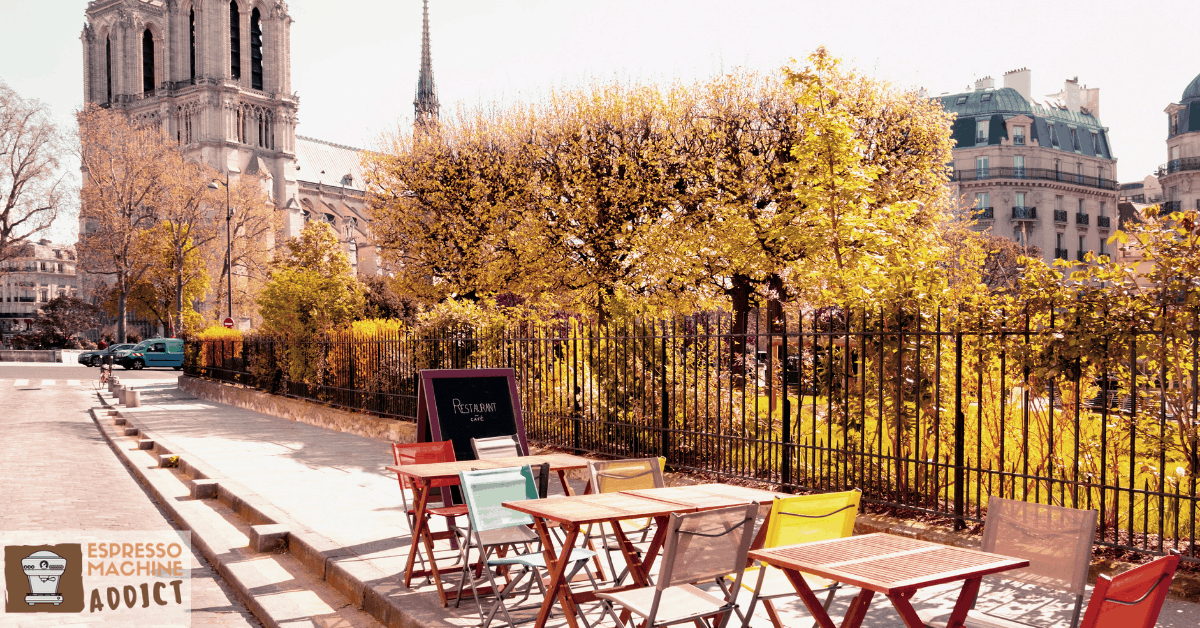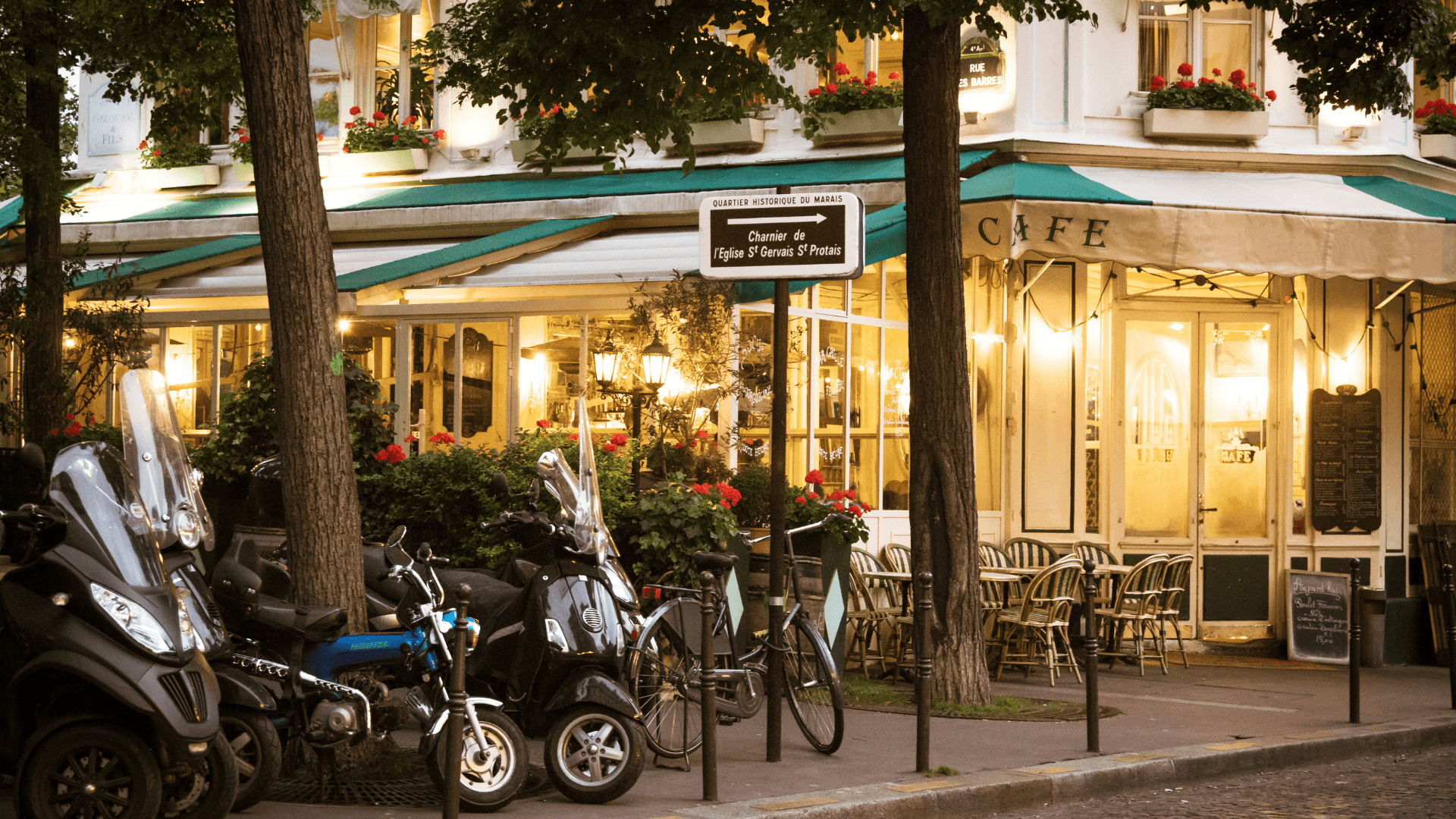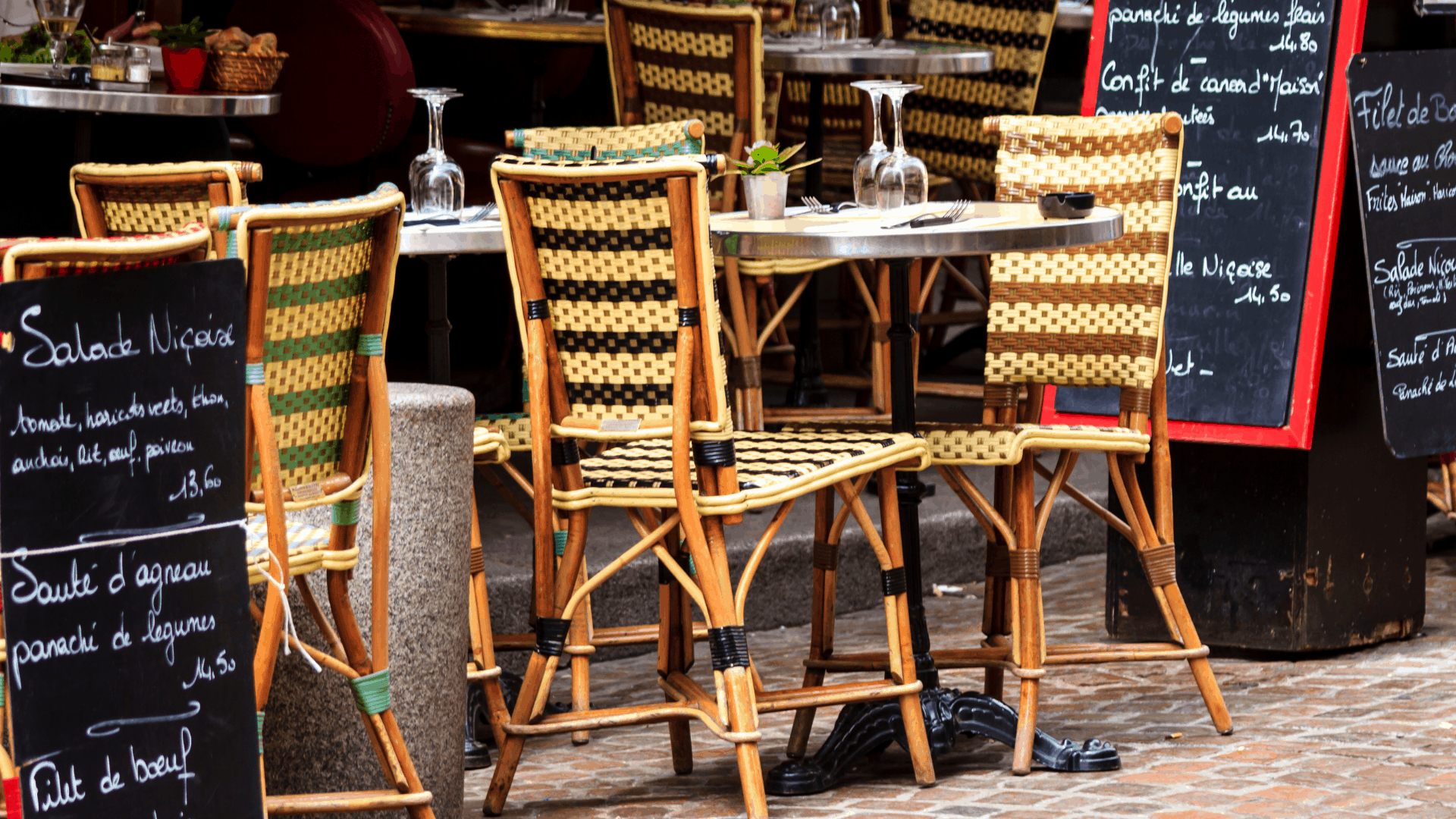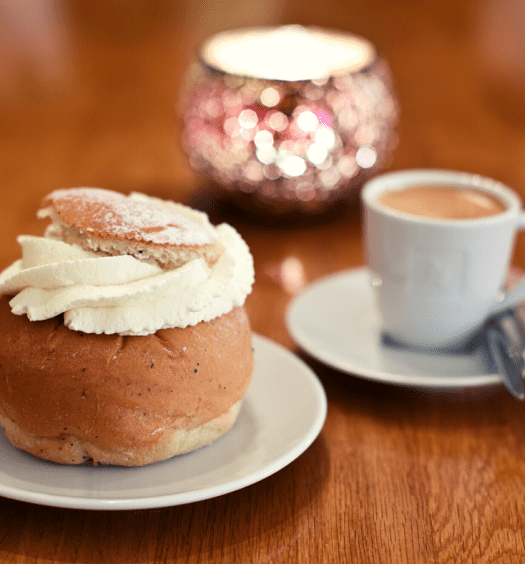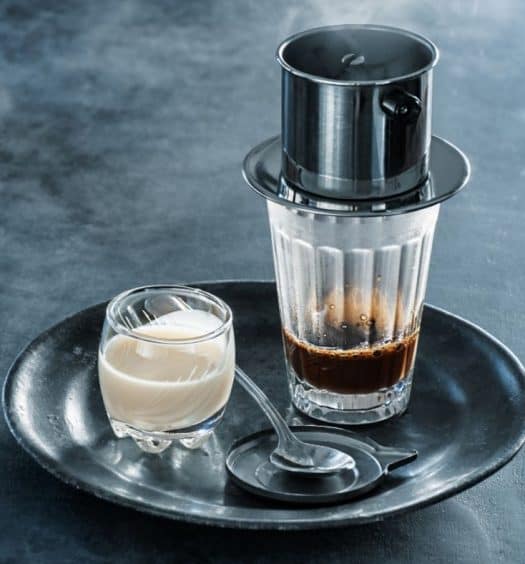When people imagine lovely coffee cafes, they typically envision a person gently holding a mug while seated outside at a wrought-iron bistro table in Paris. The window of the café where they purchased their coffee beverage is in the background, and they seem removed from the hustle and bustle of people skittering by. The image is soothing, relaxing, and comforting.
But is that really what café culture in France is like, or is the French experience of drinking coffee something different? Visiting an authentic French café offers a deeper cultural immersion, where the lack of a formal coffee menu and the understanding of common French coffee drinks play a significant role. If you’re curious about questions like that, you’re in luck. Come with us as we explore French café culture and the coffees that go with it.
History and Evolution of French Coffee Culture
French coffee culture has a rich and fascinating history that spans over four centuries. It all began in 1671 when an Armenian named Pascal opened the first coffeehouse in Paris, introducing the French to the delights of coffee. This marked the beginning of a long and storied tradition of coffee consumption in France, which has evolved and adapted to changing social, cultural, and economic trends over the years.
In the 18th century, coffeehouses became the epicenters of intellectual and artistic activity. These establishments were frequented by philosophers, writers, and artists who would gather to discuss ideas and share their work over a cup of coffee. During this period, French roast coffee was introduced, known for its intense, bittersweet flavors and boldness, which greatly influenced global coffee perceptions. This period cemented the role of coffeehouses as important social hubs in French society.
As time went on, the French coffee culture continued to evolve. The 19th and 20th centuries saw the rise of the modern café, which offered a more diverse range of coffee drinks and became a staple of everyday life in France. Today, French cafés are known for their charming ambiance and the wide variety of specialty coffee drinks they offer, reflecting the enduring importance of coffee culture in French life.
Café Culture in France
While many cultures embrace constantly being on the go, there’s one thing the French hold sacred: food and drink. In much of France, meal and beverage times are often considered an experience worth savoring, giving us that quintessential image of the Parisian café-goer sipping their drink while watching people pass by. In France, the way people drink coffee is an integral part of their daily routine, often enjoyed slowly and with great appreciation for the moment.
However, café culture in France also involves a level of etiquette that you may not see in every other country. There’s a nuance to the experience, as well as expectations of café-owners and French café-goers. While you won’t face much criticism during your first visit, if you begin frequenting the same café, you’ll want to get the hang of it.
It’s also important to note that coffee drinks with a significant amount of milk are usually only consumed in the morning. Hot milk is a key ingredient in traditional French coffee drinks like café au lait and noisette. Milky coffee variations such as café au lait and café crème are typically consumed in the morning. Additionally, espresso is typically an after-meal or solo drink, so it isn’t ordered with food in most cases.
Traditional French cafés don’t typically feature to-go options. Instead, café culture is about enjoying the experience. Steamed milk enhances the texture and flavor of classic French coffee beverages. If you’re looking for a quick cup you can take with you, focus on larger international chains. And if those aren’t available in the city you’re visiting, it’s best to assume takeaway isn’t an option.
Types of Coffee in France
Generally speaking, French coffee beverages are often similar to what you’ll find elsewhere. Their names may be different, and they may be some minor variations when it comes to approach. Still, they are usually pretty close to what you’d expect to find in cafes all around the world.
The quality of coffee beans used in these beverages is paramount, with many French cafés sourcing high-quality, ethically produced beans to ensure the best flavor.
If you’re looking for essentially an espresso shot, you can order “un café.” A “café crème” is fairly close to a latte, while a “café au lait” can either be latte-like or may simply be a filtered or pressed coffee with a dash of warm milk.
Generally, a French café is going to have a few options on the menu, often including:
- Café
- Café Allongé
- Café Noisette
- Café Crème
- Café au Lait
It is important to note that, while large café chains or cafes in major cities like Paris may be able to offer vegan alternatives to milk – like soy milk or nut milks – not all cafes have those available. Most traditional coffee shops in smaller cities don’t see enough demand to stock these items, so it isn’t wise to expect they’ll be available.
French vs. Italian Coffee
Generally speaking, French and Italian coffee has a lot in common. Often, the goal of cafes is to achieve a velvety richness. Additionally, like the Italians, French cafes tend to shy away from flavored syrups that you often find at options like Starbucks.
In a French coffee shop, the experience is more about the ambiance and the leisurely enjoyment of the coffee, rather than just the beverage itself.
When it comes to French vs. Italian coffee culture, there may be some distinct differences. In Italy, while the experience is certainly part of Italian coffee culture, the drinks themselves often steal the spotlight. Additionally, while it isn’t uncommon to quickly drink your coffee beverage while standing at Italian cafes, that isn’t the norm in France.
In France, coffee culture is more about the indulgence than the complexity of the beverage. It’s about stepping away from your hectic day and stealing a moment for yourself. Whether you simply enjoy the drink, decide to people-watch, or squeeze in some reading, it’s all about doing something for you. Lingering is perfectly acceptable, so don’t ever feel like you need to hurry as you usually don’t.
Now, this doesn’t mean you can’t get a quick caffeine hit while drinking your coffee at the bar. Instead, it just isn’t the typical approach.
How to Order Coffee in France
As mentioned above, there’s a level of etiquette that goes with ordering coffee in France. For many visitors, the preferred approach will be a bit unfamiliar. However, it usually doesn’t take much time to get comfortable with it.
When you enter a coffee shop in France, it’s important to understand the cultural norms and etiquette that come with ordering your coffee.
Whenever you enter a café in France (or any other kind of establishment), quickly offer a greeting to the proprietor, greeter, or waitstaff, as it’s considered rude not to begin with a pleasant exchange. A simple “bonjour” is typically enough to start the experience off on the right foot.
Next, don’t automatically proceed to the bar to order. Usually, bar orders are meant to be consumed quickly, so people ordering there commonly plan on finishing up fast and without much need for additional services from waitstaff. As a result, the price for the drink may be lower at the bar than at the table.
Since there’s frequently a discounted price for bar orders, taking that drink to a table after it’s made is a serious faux pas. If you prefer to have a seat and potentially linger, head to a table. Then, give your order to the waiter.
However, do make sure that the table is available before you sit, even if no one is currently seated there. Some cafes have tables that they designate for diners who plan to enjoy more than a cup of coffee and a small pastry. If you see glasses or cutlery on the table, don’t have a seat there unless you intend to order food.
When you head to the bar or the waiter arrives, make sure to say please when you ask for your drink. Usually, the easiest way to go is to state the beverage you’d like and then follow it up immediately with “s’il vous plaît’” to ensure you cover your bases.
Once your drink arrives, express your appreciation. A quick “je vous remercie” should do the trick.
In many cases, your waiter will bring your bill along with your drink. Now, this doesn’t mean you have to pay immediately or hurry while enjoying your beverage. Usually, it’s meant to be a convenience, ensuring you can settle up whenever you’re ready to do so without having to wait for them.
Coffee Ordering Mistakes in France
Usually, the biggest coffee ordering mistakes in France involve a lack of common courtesy. Not saying “hello” when you first arrive is perceived as rude and will potentially impact the quality of your whole experience. Similarly, a lack of a “please” and “thank you” won’t reflect well on you and can further diminish your experience.
Otherwise, ordering a coffee drink with a lot of milk in the afternoon may lead to some odd looks. Similarly, requesting espresso with your meal will be seen as strange. However, these are often minor faux pas, and many places will overlook them if you’re polite.
French Coffee Brands
Coffee culture in France isn’t just relegated to the country; it extends further thanks to the amazing brands available internationally. Along with being favorites at home, these French coffee brands bring some of the best of what France has to offer to the table. These brands are often enjoyed as part of a typical French breakfast, which includes simple items like a tartine or croissant.
When it comes to highly desirable French coffee brands, Carte Noire stands out from the pack. The company is a leader in premium roasts, offering up indulgent flavors that embody the Parisian café experience.
Grand’Mère Familial is another standout due to its smoothness and undeniable delectability. It’s one of France’s oldest coffee roasters, featuring a rich yet simple taste that perfectly represents the French coffee seen.
Maison de Café is also an incredibly popular option. Not only do the French adore it, but it also has fans all across the globe. The coffee is both silky and robust, making it a great option for anyone who enjoys French coffee flavors.
Travel with us as we explore coffee culture in Turkey and Norway.
